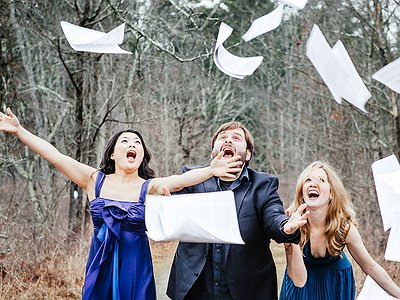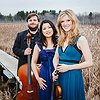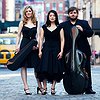Could you take us through a day in your life, from a possible morning routine through to your work? Do you have a fixed schedule? How do music and other aspects of your life feed back into each other - do you separate them or instead try to make them blend seamlessly?
Mikhail Veselov, cello: Each day has a different schedule of course, but we are usually busy working towards performances and recordings. We always have so many new pieces to learn and polish day-to-day. We have students and classes to teach as a trio and individually, and on top of our rehearsals we need to practice individually. So with all of that, our days are usually very filled.
We try to rehearse at least 3 to 4 hours each day, and on top of that I would like to practice several hours before or after rehearsal. Although music is part of my life and I put everything both emotionally and physically and give so much of myself into my art all the time, I try to give myself time to recharge, too. I love cooking, walking through museums, going to cafés to ponder, and going to movies. I need to take time for myself when I can.
Eri Nakamura, piano: Our schedule varies every day. When we are not on tour, we rehearse and practice daily, and there are always emails to catch up on, projects to have meetings about and of course teaching. When we are on tour it is more unpredictable – anything from flights getting delayed to drives sometimes taking longer than planned. No matter what, we always find time to soundcheck and get used to the performance space before the concert.We also try to find time to recharge and experience the places we visit: we love going to museums, sightseeing, and trying local delicacies. We feel so lucky to get to travel to so many different places as part of our job so getting to take it all in whenever we can is a treat.
Could you describe your creative process on the basis of a piece or album that's particularly dear to you, please? Where did the ideas come from, how were they transformed in your mind, what did you start with and how do you refine these beginnings into the finished work of art?
Anna Williams, violin: Every piece or project is its own world and delving into it can be at once exhilarating and consuming! One recent example would be our latest album of all Piazzolla music (Celebrating Piazzolla, Azica Records). This was an album that was sparked by our initial love of the Four Seasons (Estaciones Porteñas) by Astor Piazzolla. We have always loved playing the Seasons in concert and love how much energy they give not only to us as performers but also to the audience - we’ve had more than a few audience members jump up and start dancing during a concert! We have always loved the freedom and passion in both Piazzolla’s compositions and his live performances. Both were such inspirations.
When we were approached about making an all-Piazzolla album, we jumped at the chance to get to spend more time in his musical world. Taking on this project also gave us the opportunity to premiere new arrangements of Piazzolla songs by Leonardo Suárez Paz who is the son of Piazzolla’s original violinist! Spending time with Leo and getting his advice on everything from phrasing to tone colors and articulations and rhythms helped us create a fully realized musical experience. We felt so much closer to Piazzolla than ever before. It was a really eye-opening experience, and we hope the end result is something that that people will enjoy listening to as much as we enjoyed making the album!
How is preparing music, playing it live and recording it for an album connected? What do you achieve and draw from each experience personally? How do you see the relationship between improvisation and composition in this regard?
Mikhail Veselov, cello: I believe that the albums we record must have that “live performance” feeling. We try putting one thousand percent of our passion, emotion, and feelings into our performance whenever we perform. I hope that our album captures that excitement. I enjoy our collaborative process when we are preparing for performance or recording. We each have so many ideas and I love trying all to ultimately create the interpretation that represents all of us. It helps that we have similar taste in music. At recording sessions, it is very enjoyable to perform each take differently and pick which versions we like the most. Many pieces we have performed many times, but we are still discovering new things, because music is alive and it is different each time. I am inspired by my colleagues’ artistry and spontaneity. They make me become a better artist. I do also strive to learn the given composition so well that every time I perform the work, it should have the improvisational feel to it.
Art can be a purpose in its own right, but it can also directly feed back into everyday life, take on a social and political role and lead to more engagement. Can you describe your approach to art and being an artist?
Mikhail Veselov, cello: I think there is art in every aspect of life. Both art for the sake of beauty and art with a political and social role are equally important. As an artist, having both a mission and a sense of clear values is very important to me. I find that having a deeper level of engagement and connection is the reason for doing what I do. My art helps me to connect with other people and the world around me in a deeper way. Whether it is a piece by Astor Piazzolla that lifts up your mood or a trio by Shostakovich that depicts the horrors of war, both help you to connect with an audience and to have a profound shared experience that is impossible to replicate without art. I find this part of what I do very rewarding and important.
It is remarkable, in a way, that we have arrived in the 21st century with the basic concept of music and performance still intact. Do you have a vision of music and performance, an idea of what they could be beyond their current form?
Mikhail Veselov, cello: I think the basic premise of performance is invaluable and the live exchange that the performers and audience members have cannot be replicated by technology, no matter how hard it may try. I think breaking the fourth wall and including audience members is the best thing an artist can do. Performers have been striving to remove that barrier forever and there are so many incredible ways that music has been composed, performed and experienced, that if we as artists have that intention of including the audience in what we are doing, there will be many more centuries of this wonderful experience to come.




